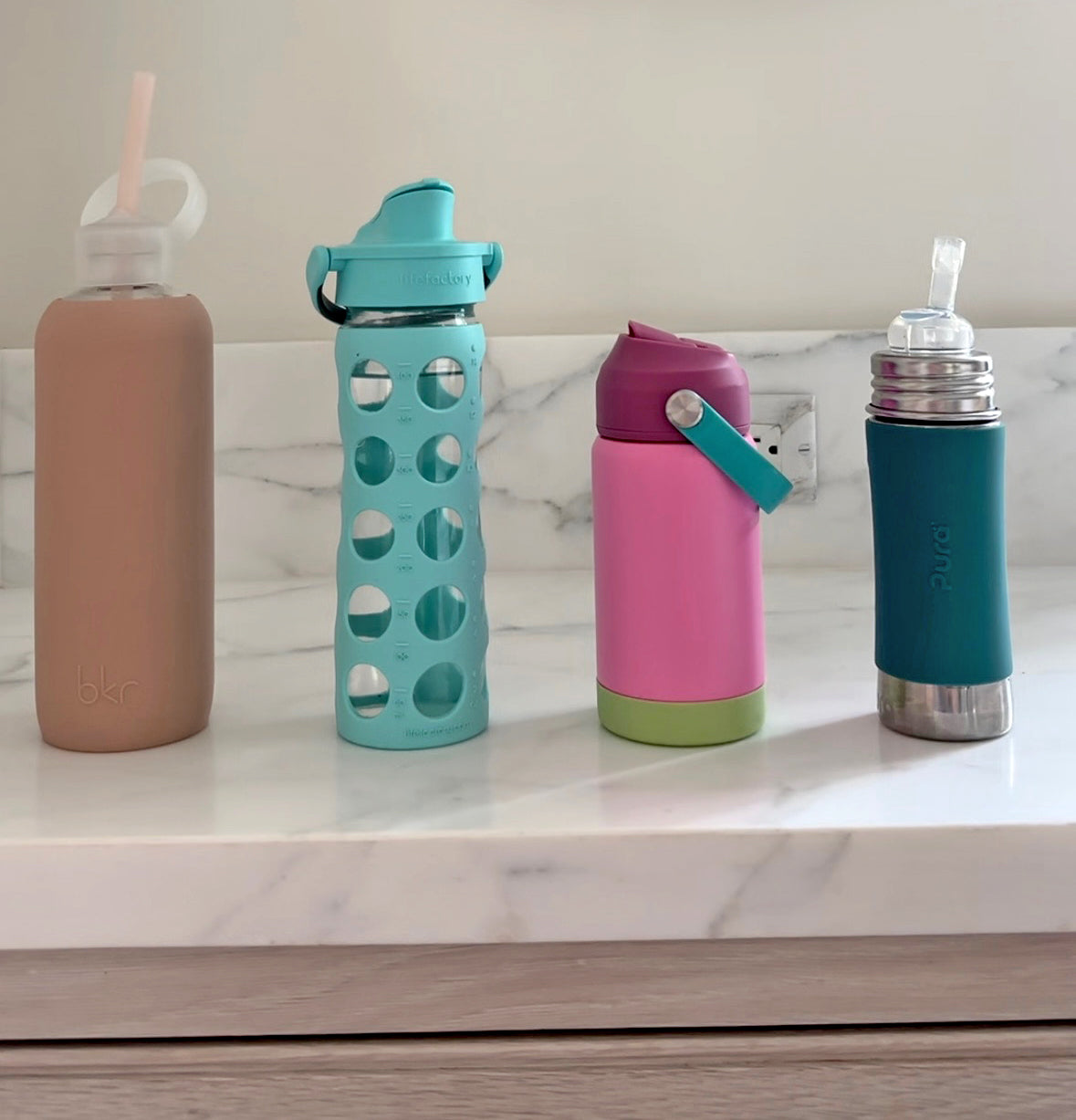How To Choose Safe Water Bottles & Our Favorite Brands

Everywhere we turn, it seems like there’s a new company selling safe water bottles. It can be confusing to navigate which are truly non-toxic.
Since it’s often a daily-use product, choosing the right bottle can make a big impact on our health, especially that of our kids who are more vulnerable to toxic exposures. If we take big strides to ensure our drinking water is safe, it only makes sense our bottles keep it that way!
Overall, when choosing a container, we want to make sure they are free of heavy metals and plasticizers, both of which are toxic in even trace amounts and can wreak havoc on our health.
It’s hard to make direct cause-and-effect correlation because symptoms from these exposures can sometimes take years to manifest. Metal buildup can lead to nervous system disorders, kidney disease, cardiovascular issues, and cancer. Plastics accumulate and impact our hormonal system, especially during critical developmental stages, such as pregnancy or puberty, and can have adverse effects on neurodevelopment and behavior.
According to The World Health Organization (WHO), "There is no known safe blood lead concentration", and even minuscule amounts found in blood "may be associated with decreased intelligence in children, behavioral difficulties and learning problems". And according to the CDC, lead exposure can also lead to growth, hearing and speech problems, and because it crosses the blood-brain-barrier, it is associated with a high risk of miscarriage.
Given this information, let’s look at some safe water bottle choices so we can ensure our exposures to heavy metals and plastics are decreased!
The Safest Water Bottle Materials (Ranked)
Glass Water Bottles - The Top Pick
Glass water bottles are the top choice to reduce exposure. While they're heavier and - of course - breakable, the toxic exposure risk is simply much lower than both BPA-free plastic and stainless steel.
You do want to see that the company has tested their glass to be free of heavy metals (lead and cadmium), which most reputable glassware companies are now doing. Some high-end water bottles use borosilicate glass, which is more durable and resistant to acidic chemicals than the more common soda-calcium glass, however both can be wonderful if test results are good!
We also prefer glass over stainless steel as metal can increase wireless radiation absorption (see below). Also with glass, there’s no transfer of taste or smell from the container, it’s stain-and-scratch-resistant and easy to clean. We love the ones with silicone sleeves and aren’t as concerned about the (safer) plastic lids (like food-grade, BPA-free, phthalate-free polypropylene with a food-grade silicone seal), as there is little contact with that area.
Stainless Steel Water Bottles
Metal water bottles are typically durable, non-corrosive, and insulated ones maintain temperatures for a long time. They’re also lightweight - probably the biggest plus for kids!
Unfortunately, if not properly manufactured or coated, they can leach lead into their contents, especially with high temperatures or if an acidic liquid like coffee is used. Many made in China have been found to contain high levels of lead, and also well-known, high-end brands have been under scrutiny for their lead levels lately. Stanley, for instance, acknowledges that lead is used in the manufacturing process, but says, "Once sealed, this area is covered with a durable stainless steel layer, making it inaccessible to consumers. Rest assured that no lead is present on the surface of any Stanley product that comes into contact with the consumer nor the contents of the product."
According to Tamara Rubin, a federal-award-winning independent advocate for childhood lead poisoning prevention, countless consumers have contacted her company, Lead Safe Mama, and let them know that their little button of stainless steel with the Stanley logo has fallen off and that they were not aware that there was a hunk of bioavailable lead. Her #1 stainless steel recommendation is HydroFlask, which pioneered an alternative sealing process for vacuum insulated bottles in 2012.
Metallic materials strongly interact with electromagnetic fields, as they attract and draw in high frequency fields by diffraction or focusing, leading to a significant enhancement of field intensity. Simply put, we’re bombarded by these electric fields and would prefer to not draw them in where we’re storing our water. However, (lead-free) stainless steel is definitely a better option than plastic…
Why Avoid Plastic Bottles
With the plethora of glass and stainless steel options, there is simply no need to turn to plastic water bottles.
While “safer” plastics and the “BPA-Free” claim often put consumers at ease, studies show that they are still leaching hundreds of chemicals. In fact, scientists have found that the 50+ alternatives to the infamous BPA (ie BPS, BPF, etc.) could be just as - if not more - harmful to our health, including a baby’s developing brain, as they readily cross the placenta. Industry is coming out with alternatives quicker than can be safety-tested, leaving it up to us - the consumer- to educate ourselves.
Bisphenol interferes with thyroid function and androgen receptors (including testosterone, which both men and women have). It’s a very complicated set of chemicals that some scientists have dubbed “chameleon chemicals” as it affects different areas of the body during different periods of development.
We do know that bisphenols found in plastic are linked to lower brain function, higher risk of obesity and high blood pressure, low sperm count, premature birth, behavioral issues and higher risk of cancer, especially endocrine-related ones. The concern only heightens when heat (ie, the sun!) is introduced to the plastic water bottle, further encouraging the transfer of bisphenols and phthalates from the container to its contents. Plastic, in general, is not a tightly-bound chemical, and some of its chemicals can even ingress into the air by riding on dust particulates.
Our Favorite Water Bottle Brands
This is not an exhaustive list, as we know there are many great brands out there!
BKR
Bink
Hydro Flask
Kerilyn
Lifefactory
Owala
Pura
Simple Modern
W&P
Yeti
What to Look For When Buying a Safe Water Bottle
There are a few things to look for when you’re choosing a new water bottle.
-
Lead-free certification
-
BPA and BPS-free materials
-
No plastic lining inside the caps
-
Dishwasher-safe, easy-to-clean design
-
Tested by third-party labs for safety
Healthier Homes with Branch Basics
Choosing a truly safe water bottle is one small but powerful step toward reducing daily toxin exposure for yourself and your family. But hydration is just one piece of creating a healthier home environment. The same care you take with what you drink from should extend to how you clean, cook, and care for your space.
If you’re ready to swap harsh, chemical-based cleaners for something safer, try the Branch Basics Starter Kit. It’s a simple, all-in-one system that replaces every cleaner in your home with one powerful, human-safe Concentrate. No harmful fragrances, preservatives, or synthetic additives.
Cites & Studies:
- Estrogenic chemicals often leach from BPA-free plastic products that are replacements for BPA-containing polycarbonate products
- More Lead Safe Mama Lead-free favorites: water bottles I have purchased for my family
- Are Reusable Plastic Bottles Leaching Hundreds of Chemicals into your Water?
- Is There Lead in Your Reusable Water Bottle?
Categories

Allison Evans
Allison has dedicated herself to helping others reap the benefits of clean living. She, along with her husband and two daughters left Houston for the country life as she heals from a recent mold exposure and diagnosis of chronic Lyme disease. Follow her story on our Instagram and read more about her Journey to Fertility.








